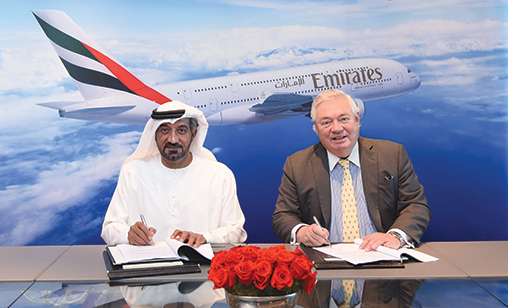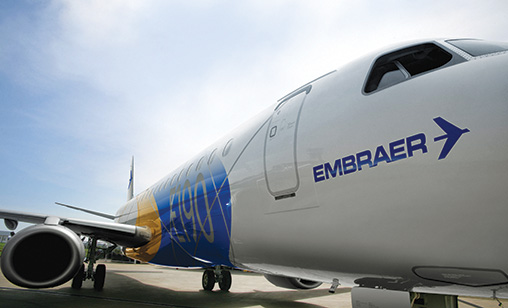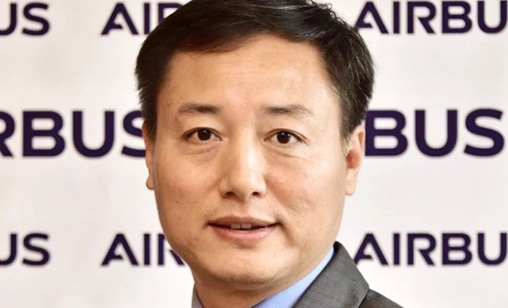Main Story
Winning ways
Structural shifts in both ownership and senior management at Airbus and Boeing herald a consolidation in the aircraft industry that had not been anticipated. Chief correspondent, Tom Ballantyne, reports on the possible impact of Airbus’s recent investment in Bombardier, its Emirates A380 deal and Boeing’s interest in Embraer.
February 1st 2018
Only days before his retirement, Airbus chief operating officer customers, John Leahy, and his team signed a deal the manufacturer had been chasing for months – a Memorandum of Understanding (MoU) for 36 more A380s with the aircraft’s biggest customer, Emirates Airline. Read More »
Soon to retire Leahy had made it plain the program was in jeopardy. He said the company would have “no choice” but to stop producing the plane if it could not work out a deal with Emirates Airline for more A380s.
 |
“Quite honestly, if we can’t work out a deal with Emirates, I think there is no choice but to shut down the program,” he said. “I am hopeful we will work out a deal [with Emirates] and that others can add airplanes on top of that. “Emirates is probably the only one with the ability in the market place to take a minimum of six [A380s] a year for up eight to 10 years. And we can add some on top of that.”
The MoU for the A380s, announced on January 18, is a commitment for 20 A380s with 16 options, at list prices of US$16 billion. Deliveries will commence in 2020.
“This new order underscores Airbus’ commitment to produce the A380 at least for another ten years. I am personally convinced more orders will follow Emirates’ example and that this great aircraft will be built well into the 2030s,” Leahy said at the announcement in Dubai.
During the Dubai Air Show last November, Emirates president, Sir Tim Clark, said an A380 deal with Airbus was “very much down to them. I think the ownership here [at Emirates] is concerned about continuation of the A380”.
“They need some copper-plated guarantees that if we buy some more, then the line will be continued for a minimum period of ten years. They are fully aware of the consequences of cancellation and leaving us high and dry.”
Elsewhere in the group Airbus has expanded customer choice for its aircraft with a planned majority purchase of Bombardier’s C Series jet program. In October, the Toulouse manufacturer announced it would acquire 50.01% of the Canadian commercial jet program, subject to regulatory and government approvals, in a deal that involved zero up-front cash from Airbus and provided it with a multi-billion dollar, ready-to-fly regional jet pretty much for free.
Several thousand miles away, Boeing reacted to Airbus’s part acquisition of Bombardier with the news, in late December, that it had approached Embraer about buying into the Brazilian aircraft manufacturer.
| 'Our goal is a step-change improvement in supply chain management to support Boeing’s aspiration to be a global industrial champion. Its design focuses on improving strategy development, procurement processes, contracting and fulfillment operations, in addition to streamlining bureaucracy that impacts on Boeing teams and suppliers. Boeing’s supply chain accounts for 65% of the cost of every airplane' |
It was reported in the week leading to Christmas that the two companies had agreed to terms of sale that valued Embraer at US$28 per share. Clinching the deal, however, could be quite another matter.
Employees at the Embraer’s main production campus at Sao Jose dos Campos oppose the Boeing offer out of fear that the purchase would risk the jobs of 16,000 Embraer employees in Brazil.
Embraer was privatized in 1994, but the Brazilian government has retained a Golden Share in the company that gives it a veto over any transaction that would transfer control of the former state-owned business to a new owner.
Brazilian President, Michael Temer, said the government welcomed new investment in Embraer, but would not permit a change in control of the company.
Another issue hindering a Boeing deal is Embraer’s strong ties with the country’s military establishment. People familiar with the matter said Boeing would have to agree to safeguard Embraer’s defence unit. In response, Boeing has said the deals it has written in Australia and Britain show it could operate defense businesses without compromising military strategy.
According to sources, representatives from both companies and Brazil’s government are exploring defense protections that would give Boeing full access to Embraer’s product lineup.
Boeing also is pledging to retain the Embraer brand and to include the Brazilian company’s engineers on programs such as the potential jetliner, known as the “new mid-market airplane”.
BNDESpar, the Brazilian state development bank’s investment arm, is among Embraer’s largest shareholders, with 5.4% in equity. Other investors include state-controlled banks Banco do Brasil SA and Caixa Economica Federal SA.
 |
At the same time, Boeing is planning a major reorganization of its critical supply chain that will consolidate four departments into one supplier management group. Like the restructuring of many components of Airbus’s manufacturing divisions, the changes will add up to a new era in commercial jet innovation and production at Boeing.
In Toulouse, a management transition that commenced when Leahy announced last June that he would retire in early 2018, continues. Airbus chief operating officer and president Airbus Commercial Aircraft, Fabrice Bregier, 56, steps down this month. He will be succeeded by Guillaume Faury, previously the chief executive of Airbus Helicopters.
Airbus group chief executive, Tom Enders, 59, has announced he will depart the group at the end of his current contract, in April 2019. Plans to identify a successor to Enders are underway. Former president of civil aerospace at Rolls-Royce, Eric Schulz, has taken over from long-serving Leahy.
In China, the president of Airbus Commercial Aircraft China, Eric Chen, has moved up to chairman of Airbus China following the retirement of Laurence Barron.
George Xu, who was chairman of the board of the Airbus Tianjin A320 Family Final Assembly Line has been appointed chief executive of Airbus China. In his role as country head, he is responsible for all Airbus commercial aircraft activities and for leading the company’s helicopter, defence and space businesses on the Mainland.
Enders said in his retirement statement Airbus needed “fresh minds for the 2020s” and that he would use the remainder of his time to ensure a smooth transition to strengthen the company’s ethics and compliance programs.
Authorities in Britain and France are investigating alleged fraud and bribery related to Airbus use of outside consultants for commercial aircraft sales, with the company warning that the investigations could lead to “significant penalties”. It has promised to stop working with middlemen. Austria is also investigating suspected fraud in the government’s purchase of Airbus combat aircraft.
The governments of France and Germany, both with holdings in Airbus, are paying close attention to the management changes and the progress of the legal investigations.
“We obviously need to keep an eye on our strategic interests and (Airbus) governance, which must be exemplary,” said French president, Emmanuel Macron. Speaking in Brussels alongside German Chancellor, Angela Merkel, Macron insisted the two governments would not “interfere politically to return to a role in the daily management of the company”, but added he wanted the Airbus board to provide clarification about the executive shakeup.
 |
Boeing would not be drawn on details of its supply chain restructuring, but said it would represent a “step-change improvement” to supply chain management. “Just as we work with suppliers to improve their operations, we also are taking action within Boeing to improve performance and efficiency,” a company spokesman said.
Amidst all of these changes, the good news is that the market for commercial jets continues to boom. Last month, Airbus announced it had delivered 718 aircraft to 85 customers in 2017, more than 4% higher than the 688 airplanes delivered a year earlier. It received 1,109 net orders from 44 customers, which produced a revised backlog to December 31 of 7,265 aircraft, valued at more than $1 trillion.
Boeing topped Airbus in deliveries for the year with 763 aircraft accepted by customers for the 12 months. It also reported a record order backlog. With the Asia-Pacific market on track to become the biggest growth market for jets, one in every four Boeing aircraft, including one in every three B787s, was delivered to customers in China, Boeing Commercial Airplanes vice president marketing, Randy Tinseth, said.
“It’s a market that is underserved by any calculation. We are not talking about a couple of planes, but hundreds of airplanes,” he said. China is the largest market for the B787, where 20% of all B787 flights are to, from or around China. Some 40% of Boeing’s record 5,864 airplane backlog, which represents about seven years of production, is from Asia-Pacific customers.